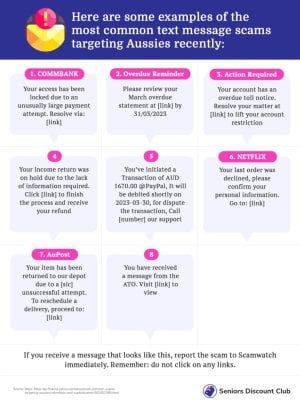Are you at risk? Here are the most common scams to keep an eye out for in 2023!
- Replies 7
In recent years, Australians have been caught in the crosshairs of a massive wave of text-message scams.
The situation has become so dire that scammers have grown even more brazen, going to great lengths to deceive their victims and swindle them out of their hard-earned money.
According to the telecommunications service provider TPG Telecom, over 22 million text-message scams have been blocked so far this year alone.
These scams are becoming increasingly sophisticated as scammers use cutting-edge technology to make their calls appear to be coming from legitimate phone numbers.
In some cases, they even send text messages that appear to be part of the same conversation thread as past legitimate messages, making it even more challenging for their victims to spot the deception.

Last year, TPG Telecom prevented nearly half a billion SMS scams, a staggering figure that underscores the scale of the problem.
And the financial toll of these scams is no less staggering: the Australian Competition and Consumer Commission (ACCC) reported that a whopping $169 million was stolen from unsuspecting Australians in 2022 via SMS and phone scams.
Cyber security experts have been hard at work trying to keep up with the ever-evolving tactics used by fraudsters. Thanks to their efforts, we now have a better understanding of the most common scams being used against Australians.
At the top of the list are imposters posing as:

As Mitchell Bingemann, Head of External Communications for TPG Telecom, explained in a recent interview, these scammers are becoming increasingly sophisticated in their methods.
They will stop at nothing to trick their victims into giving away their personal and bank information.
Fortunately, the Australian government has taken notice of this problem and is taking steps to address it. The announcement of an SMS whitelist, which would prevent fraudsters from spoofing legitimate businesses, is a promising development.
If this system can be implemented quickly, it could go a long way in reducing SMS scams and protecting us from financial harm.
Here are some top tips to help you protect yourself from scammers:
Be alert: If you receive a call or message that seems suspicious, don't be afraid to ask questions. If you're unsure whether a call is legitimate, hang up and call back using the number of the company listed on their official website.
Stop before you click: Scammers often use phishing emails or messages to trick you into clicking on suspicious links or giving away your personal or banking details. Always think before you click, and never hand over your personal or banking details to someone you don't trust.
Double-check payment details: Scammers may try to trick you into making payments to them by pretending to be a legitimate company. Always double-check payment details, and if you're unsure, check with your bank or the company directly before submitting any payment information.
Look out for spelling mistakes and grammar: Scammers often make spelling and grammar mistakes in their messages, which can be a clear giveaway that it's a scam. Always be on the lookout for these red flags and stay alert for potential scams.
By following these tips, you can stay one step ahead of scammers and protect yourself from financial harm. Remember, it's always better to be safe than sorry when it comes to your personal and financial information.

Thank you for taking the time to read this article! We hope it has been helpful and informative. Remember, staying informed and vigilant is key to protecting yourself from scammers and cybercriminals.
By following the tips we've provided and keeping up-to-date with the latest scams, you can stay safe online and avoid falling victim to fraud.
For more information on current fraud cases and phishing attacks, we recommend visiting the Scam Watch forum on the SDC website. Stay safe, and don't hesitate to reach out to your bank or authorities if you suspect any fraudulent activity.
The situation has become so dire that scammers have grown even more brazen, going to great lengths to deceive their victims and swindle them out of their hard-earned money.
According to the telecommunications service provider TPG Telecom, over 22 million text-message scams have been blocked so far this year alone.
These scams are becoming increasingly sophisticated as scammers use cutting-edge technology to make their calls appear to be coming from legitimate phone numbers.
In some cases, they even send text messages that appear to be part of the same conversation thread as past legitimate messages, making it even more challenging for their victims to spot the deception.

Aussies have been bombarded with text-message scams over the past couple of years, and many are still losing hard-earned cash. Credit: Unsplash/Robin Worrall.
Last year, TPG Telecom prevented nearly half a billion SMS scams, a staggering figure that underscores the scale of the problem.
And the financial toll of these scams is no less staggering: the Australian Competition and Consumer Commission (ACCC) reported that a whopping $169 million was stolen from unsuspecting Australians in 2022 via SMS and phone scams.
Cyber security experts have been hard at work trying to keep up with the ever-evolving tactics used by fraudsters. Thanks to their efforts, we now have a better understanding of the most common scams being used against Australians.
At the top of the list are imposters posing as:

Scammers are using new technology to trick their victims, making the call appear to come from legitimate phone numbers or sending texts that appear in the same conversation thread as genuine messages. Credit: Unsplash/Adem Ay.
As Mitchell Bingemann, Head of External Communications for TPG Telecom, explained in a recent interview, these scammers are becoming increasingly sophisticated in their methods.
They will stop at nothing to trick their victims into giving away their personal and bank information.
Fortunately, the Australian government has taken notice of this problem and is taking steps to address it. The announcement of an SMS whitelist, which would prevent fraudsters from spoofing legitimate businesses, is a promising development.
If this system can be implemented quickly, it could go a long way in reducing SMS scams and protecting us from financial harm.
Here are some top tips to help you protect yourself from scammers:
Be alert: If you receive a call or message that seems suspicious, don't be afraid to ask questions. If you're unsure whether a call is legitimate, hang up and call back using the number of the company listed on their official website.
Stop before you click: Scammers often use phishing emails or messages to trick you into clicking on suspicious links or giving away your personal or banking details. Always think before you click, and never hand over your personal or banking details to someone you don't trust.
Double-check payment details: Scammers may try to trick you into making payments to them by pretending to be a legitimate company. Always double-check payment details, and if you're unsure, check with your bank or the company directly before submitting any payment information.
Look out for spelling mistakes and grammar: Scammers often make spelling and grammar mistakes in their messages, which can be a clear giveaway that it's a scam. Always be on the lookout for these red flags and stay alert for potential scams.
By following these tips, you can stay one step ahead of scammers and protect yourself from financial harm. Remember, it's always better to be safe than sorry when it comes to your personal and financial information.
Key Takeaways
- Recently, Australians have been bombarded with text-message scams, with fraudsters becoming increasingly sophisticated in their methods.
- The most common scams include imposters pretending to be from Commonwealth Bank, e-toll companies, Australia Post, PayPal, The ATO, and Netflix.
- To avoid falling victim to scams, it's important to be alert, never hand over personal or banking details, double-check payment details, and watch out for spelling mistakes and grammar errors in messages.
Thank you for taking the time to read this article! We hope it has been helpful and informative. Remember, staying informed and vigilant is key to protecting yourself from scammers and cybercriminals.
By following the tips we've provided and keeping up-to-date with the latest scams, you can stay safe online and avoid falling victim to fraud.
For more information on current fraud cases and phishing attacks, we recommend visiting the Scam Watch forum on the SDC website. Stay safe, and don't hesitate to reach out to your bank or authorities if you suspect any fraudulent activity.








